- Home
- Robert Harris
Enigma
Enigma Read online
Contents
About the Book
About the Author
Also by Robert Harris
Title Page
Dedication
Author’s Note
Epigraph
Chapter One: Whispers
Chapter Two: Cryptogram
Chapter Three: Pinch
Chapter Four: Kiss
Chapter Five: Crib
Chapter Six: Strip
Chapter Seven: Plaintext
Acknowledgements
Copyright
About the Book
March 1943, the war hangs in the balance, and at Bletchley Park Tom Jericho, a brilliant young codebreaker, is facing a double nightmare. The Germans have unaccountably changed their U-boat Enigma code, threatening a massive Allied defeat. And as suspicion grows that there may be a spy inside Bletchley, Jericho’s girlfriend, the beautiful and mysterious Claire Romilly, suddenly disappears.
About the Author
Robert Harris is the author Fatherland, Enigma, Archangel, Pompeii and Imperium - all of which were worldwide bestsellers. His work has been translated into thirty-three languages. He was born in Nottingham in 1957 and is a graduate of Cambridge University. He worked as a reporter on the BBC's Newsnight and Panorama programmes, before becoming Political Editor of the Observer in 1987, and then a columnist on the Sunday Times and the Daily Telegraph. In 2003 he was named Columnist of the Year in the British Press Awards. He lives near Hungerford in Berkshire with his wife and their four children.
Also by Robert Harris
FICTION
Fatherland
Archangel
Pompeii
Imperium
The Ghost
Lustrum
NON-FICTION
A Higher Form of Killing (with Jeremy Paxman)
Gotcha! The Making of Neil Kinnock
Selling Hitler Good and Faithful Servant
For Gill,
and for Holly and Charlie
QXQF VFLR TXLG VLWD PRUA
Author’s Note
This novel is set against the background of an actual historical event. The German naval signals quoted in the text are all authentic. The characters, however, are entirely fictional.
‘It looks as if Bletchley Park is the single greatest achievement of Britain during 1939–45, perhaps during this century as a whole.’
George Steiner
‘A mathematical proof should resemble a simple and clear-cut constellation, not a scattered cluster in the Milky Way. A chess problem also has unexpectedness, and a certain economy; it is essential that the moves should be surprising, and that every piece on the board should play its part.’
G.H. Hardy, A Mathematician’s Apology
ONE
WHISPERS
WHISPERS: the sounds made by an enemy wireless transmitter immediately before it begins to broadcast a coded message.
A Lexicon of Cryptography
(‘Most Secret’, Bletchley Park, 1943)
1
CAMBRIDGE IN THE fourth winter of the war: a ghost town.
A ceaseless Siberian wind with nothing to blunt its edge for a thousand miles whipped off the North Sea and swept low across the Fens. It rattled the signs to the air-raid shelters in Trinity New Court and battered on the boarded-up windows of King’s College Chapel. It prowled through the quadrangles and staircases, confining the few dons and students still in residence to their rooms. By mid-afternoon the narrow cobbled streets were deserted. By nightfall, with not a light to be seen, the university was returned to a darkness it hadn’t known since the Middle Ages. A procession of monks shuffling over Magdalene Bridge on their way to Vespers would scarcely have seemed out of place.
In the wartime blackout the centuries had dissolved.
It was to this bleak spot in the flatlands of eastern England that there came, in the middle of February 1943, a young mathematician named Thomas Jericho. The authorities of his college, King’s, were given less than a day’s notice of his arrival – scarcely enough time to reopen his rooms, put sheets on his bed, and have more than three years’ worth of dust swept from his shelves and carpets. And they would not have gone to even that much trouble, it being wartime and servants so scarce – had not the Provost himself been telephoned at the Master’s Lodge by an obscure but very senior official of His Majesty’s Foreign Office, with a request that ‘Mr Jericho be looked after until he is well enough to return to his duties’.
‘Of course,’ replied the Provost, who couldn’t for the life of him put a face to the name of Jericho. ‘Of course. A pleasure to welcome him back.’
As he spoke, he opened the college register and flicked through it until he came to: Jericho, T. R. G.; matriculated, 1935; Senior Wrangler, Mathematics Tripos, 1938; Junior Research Fellow at two hundred pounds a year; not seen in the university since the outbreak of war.
Jericho? Jericho? To the Provost he was at best a dim memory, a fuzzy adolescent blob on a college photograph. Once, perhaps, he would have remembered the name, but the war had shattered the sonorous rhythm of intake and graduation and all was chaos – the Pitt Club was a British Restaurant, potatoes and onions were growing in the gardens of St John’s …
‘He has recently been engaged upon work of the gravest national importance,’ continued the caller. ‘We would appreciate it if he were not disturbed.’
‘Understood,’ said the Provost. ‘Understood. I shall see to it he is left alone.’
‘We are obliged to you.’
The official rang off. ‘Work of the gravest national importance’, by God … The old man knew what that meant. He hung up and looked thoughtfully at the receiver for a few moments, then went in search of the domestic bursar.
A Cambridge college is a village, with a village’s appetite for gossip – all the keener when that village is nine-tenths empty – and the return of Jericho provoked hours of analysis among the college staff.
There was, for a start, the manner of his arrival – a few hours after the call to the Provost, late on a snowy night, swaddled in a travelling rug, in the back of a cavernous official Rover driven by a young chauffeuse in the dark blue uniform of the Women’s Royal Navy. Kite, the porter, who offered to carry the visitor’s bags to his rooms, reported that Jericho clung to his pair of battered leather suitcases and refused to let go of either, even though he looked so pale and worn out that Kite doubted he would make it up the spiral staircase unaided.
Dorothy Saxmundham, the bedder, saw him next, when she went in the following day to tidy up. He was propped on his pillows staring out at the sleet pattering across the river, and he never turned his head, never even looked at her, didn’t seem to know she was there, poor lamb. Then she went to move one of his cases and he was up in a flash – ‘Please don’t touch that, thank you so much, Mrs Sax, thank you’ – and she was out on the landing in a quarter of a minute.
He had only one visitor: the college doctor, who saw him twice, stayed for about fifteen minutes on each occasion, and left without saying a word.
He took all his meals in his room for the first week – not that he ate very much, according to Oliver Bickerdyke, who worked in the kitchens: he took up a tray three times a day, only to take it away again an hour later, barely touched. Bickerdyke’s great coup, which led to at least an hour of speculation around the coke stove in the Porter’s Lodge, was to come upon the young man working at his desk, wearing a coat over his pyjamas, a scarf and a pair of mittens. Normally, Jericho ‘sported his oak’ – that is to say, he kept the heavy outer door to his study firmly shut – and called politely for his tray to be left outside. But on this particular morning, six days after his dramatic arrival, he had left it slightly ajar. Bickerdyke deliberately brushed the wood lightly with his knuckles, so quie
tly as to be inaudible to any living creature, save possibly a grazing gazelle, and then he was across the threshold and within a yard of his quarry before Jericho turned round. Bickerdyke just had time to register piles of papers (‘covered in figures and circuits and Greek and suchlike’) before the work was hastily covered up and he was sent on his way. Thereafter the door remained locked.
Listening to Bickerdyke’s tale the next afternoon, and not wishing to be outdone, Dorothy Saxmundham added a detail of her own. Mr Jericho had a small gas fire in his sitting room and a grate in his bedroom. In the grate, which she had cleaned that morning, he had obviously burned a quantity of paper.
There was silence while this intelligence was digested.
‘Could be The Times,’ said Kite eventually. ‘I puts a copy of The Times under his door every morning.’
No, declared Mrs Sax. It was not The Times. They were still in a pile by the bed. ‘He doesn’t seem to read them, not as I’ve noticed. He just does the crosswords.’
Bickerdyke suggested he was burning letters. ‘Maybe love letters,’ he added, with a leer.
‘Love letters? Him? Get away.’ Kite took off his antique bowler hat, inspected its frayed brim, then replaced it carefully on his bald head. ‘Besides, he ain’t had any letters, not a single one, not since he’s been here.’
And so they were forced to the conclusion that what Jericho was burning in his grate was his work – work so secret, nobody could be allowed to see even a fragment of the waste. In the absence of hard fact, fantasy was piled upon fantasy. He was a government scientist, they decided. No, he worked in Intelligence. No, no – he was a genius. He had had a nervous breakdown. His presence in Cambridge was an official secret. He had friends in high places. He had met Mr Churchill. He had met the King …
In all of which speculation, they would have been gratified to learn, they were absolutely and precisely correct.
Three days later, early on the morning of Friday 26 February, the mystery was given a fresh twist.
Kite was sorting the first delivery of mail, stuffing a small sackful of letters into the few pigeon holes whose owners were still in college, when he came across not one but three envelopes addressed to T. R. G. Jericho Esq, originally sent care of the White Hart Inn, Shenley Church End, Buckinghamshire, and subsequently forwarded to King’s. For a moment, Kite was taken aback. Did the strange young man, for whom they had constructed such an exotic identity, in reality manage a pub? He pushed his spectacles up on to his forehead, held the envelope at arm’s length, and squinted at the postmarks.
Bletchley.
There was an old Ordnance Survey map hanging at the back of the lodge, showing the dense triangle of southern England enclosed by Cambridge, Oxford and London. Bletchley sat astride a big railway junction exactly midway between the two university towns. Shenley Church End was a tiny hamlet about four miles north-west of it.
Kite studied the more interesting of the three envelopes. He raised it to his bulbous, blue-veined nose. He sniffed it. He had been sorting mail for more than forty years and he knew a woman’s handwriting when he saw it: clearer and neater, more looped and less angular than a man’s. A kettle was boiling on the gas ring at the back of the stove. He glanced around. It was not yet eight, and barely light outside. Within seconds he had stepped into the alcove and was holding the flap of the envelope to the steam. It was made of thin, shoddy wartime paper, sealed with cheap glue. The flap quickly moistened, curled, opened, and Kite extracted a card.
He had just about read through to the end when he heard the lodge door open. A blast of wind shook the windows. He stuffed the card back into the envelope, dipped his little finger into the glue pot kept ready by the stove, stuck down the flap, then casually poked his head round the corner to see who had come in. He almost had a stroke.
‘Good heavens – morning – Mr Jericho – sir …’
‘Are there any letters for me, Mr Kite?’ Jericho’s voice was firm enough, but he seemed to sway slightly and held on to the counter like a sailor who had just stepped ashore after a long voyage. He was a pale young man, quite short, with dark hair and dark eyes – twin darknesses that served to emphasise the pallor of his skin.
‘Not as I’ve noticed, sir. I’ll look again.’
Kite retreated with dignity to the alcove and tried to iron out the damp envelope with his sleeve. It was only slightly crumpled. He slipped it into the middle of a handful of letters, came out to the front, and performed – even if he said so himself – a virtuoso pantomime of searching through them.
‘No, no, nothing, no. Ah, yes, here’s something. Gracious. And two more.’ Kite proffered them across the counter. ‘Your birthday, sir?’
‘Yesterday.’ Jericho stuffed the envelopes into the inside pocket of his overcoat without glancing at them.
‘Many happy returns, sir.’ Kite watched the letters disappear and gave a silent sigh of relief. He folded his arms and leaned forward on the counter. ‘Might I hazard a guess at your age, sir? Came up in ’thirty-five, as I recall. Would that make you, perhaps, twenty-six?’
‘I say, is that my newspaper, Mr Kite? Perhaps I might take it. Save you the trouble.’
Kite grunted, pushed himself back up on his feet and fetched it. He made one last attempt at conversation as he handed it over, remarking on the satisfactory progress of the war in Russia since Stalingrad and Hitler being finished if you asked him – but, of course, that he, Jericho, would surely be more up to date about such matters than he, Kite …? The younger man merely smiled.
‘I doubt if my knowledge about anything is as up to date as yours, Mr Kite, not even about myself. Knowing your methods.’
For a moment, Kite was not sure he had heard correctly. He stared sharply at Jericho, who met his gaze and held it with his dark brown eyes, which seemed suddenly to have acquired a glint of life. Then, still smiling, Jericho nodded ‘Good morning’, tucked his paper under his arm and was gone. Kite watched him through the lodge’s mullioned window – a slender figure in a college scarf of purple and white, unsteady on his feet, head bowed into the wind. ‘My methods,’ he repeated to himself. ‘My methods?’
That afternoon, when the trio gathered for tea as usual around the coke stove, he was able to advance a whole new explanation for Jericho’s presence in their midst. Naturally, he could not disclose how he came by his information, only that it was especially reliable (he hinted at a man-to-man chat). Forgetting his earlier scorn about love letters, Kite now asserted with confidence that the young fellow was obviously suffering from a broken heart.
2
Jericho did not open his letters immediately. Instead he squared his shoulders and tilted forwards into the wind. After a week in his room, the richness of the oxygen pummelling his face made him feel light-headed. He turned right at the Junior Combination Room and followed the flagstone path that led through the college and over the little hump-back bridge to the water meadow beyond. To his left was the college hall, to his right, across a great expanse of lawn, the massive cliff-face of the chapel. A tiny column of choirboys was bobbing through its grey lee, gowns flapping in the gale.
He stopped, and a gust of wind rocked him on his heels, forcing him half a step backwards. A stone passageway led off from one side of the path, its arch grown over with untended ivy. He glanced, by force of habit, at the set of windows on the second floor. They were dark and shuttered. Here, too, the ivy had been allowed to grow unchecked, so that several of the small, diamond-shaped panes were lost behind thick foliage.
He hesitated, then stepped off the path, under the keystone, into the shadows.
The staircase was just as he remembered it, except that now this wing of the college was closed and the wind had blown dead leaves into the well of the steps. An old newspaper curled itself around his legs like a hungry cat. He tried the light switch. It clicked uselessly. There was no bulb. But he could still make out the name, one of three painted on a wooden board in elegant white capitals, now cracke
d and faded.
TURING, A.M.
How nervously he had climbed these stairs for the first time – when? in the summer of 1938? a world ago – to find a man barely five years older than himself, as shy as a freshman, with a hank of dark hair falling across his eyes: the great Alan Turing, the author of On Computable Numbers, the progenitor of the Universal Computing Machine …
Turing had asked him what he proposed to take as his subject for his first year’s research.
‘Riemann’s theory of prime numbers.’
‘But I am researching Riemann myself.’
‘I know,’ Jericho had blurted out, ‘that’s why I chose it.’
And Turing had laughed at this outrageous display of hero worship, and had agreed to supervise Jericho’s research, even though he hated teaching.
Now Jericho stood on the landing and tried Turing’s door. Locked, of course. The dust smeared his hand. He tried to remember how the room had looked. Squalor had been the overwhelming impression. Books, notes, letters, dirty clothes, empty bottles and tins of food had been strewn across the floor. There had been a teddy bear called Porgy on the mantelpiece above the gas fire, and a battered violin leaning in the corner, which Turing had picked up in a junk shop.
Turing had been too shy a man to get to know well. In any case, from the Christmas of 1938 he was hardly ever to be seen. He would cancel supervisions at the last minute saying he had to be in London. Or Jericho would climb these stairs and knock and there would be no reply, even though Jericho could sense he was behind the door. When, at last, around Easter 1939, not long after the Nazis had marched into Prague, the two men had finally met, Jericho had nerved himself to say: ‘Look, sir, if you don’t want to supervise me …’
‘It’s not that.’
‘Or if you’re making progress on the Riemann Hypothesis and you don’t want to share it …’
Turing had smiled. ‘Tom, I can assure you I am making no progress on Riemann whatsoever.’

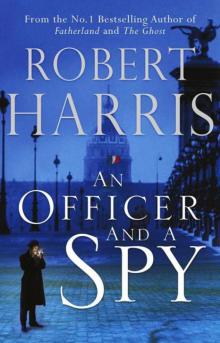 An Officer and a Spy
An Officer and a Spy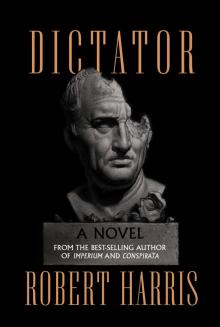 Dictator
Dictator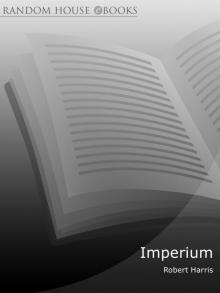 Imperium:
Imperium: Enigma
Enigma Fatherland
Fatherland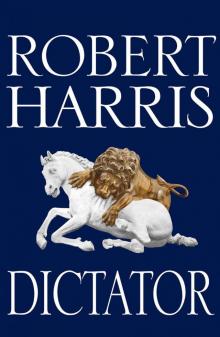 Dictator:
Dictator: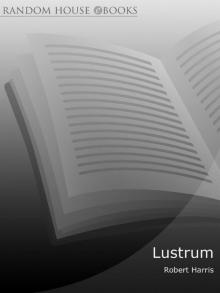 Lustrum
Lustrum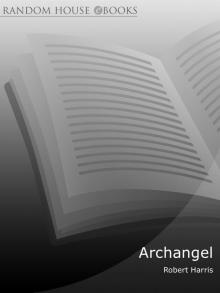 Archangel
Archangel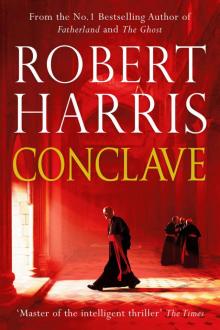 Conclave
Conclave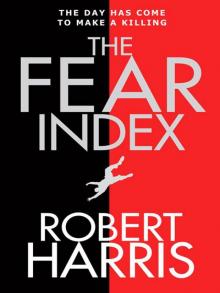 The Fear Index
The Fear Index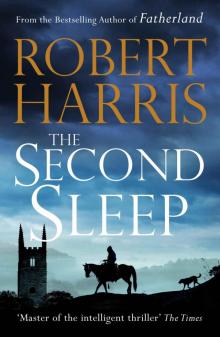 The Second Sleep
The Second Sleep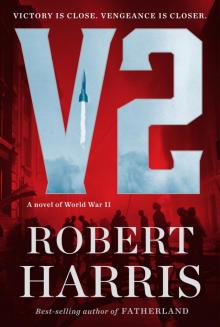 V2
V2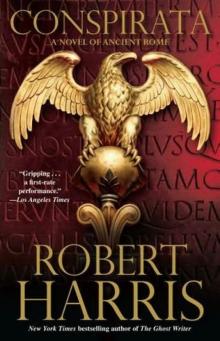 Lustrum c-2
Lustrum c-2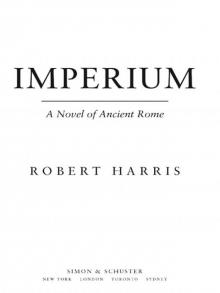 Imperium
Imperium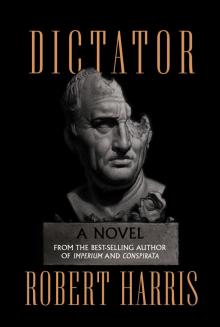 The Dictator
The Dictator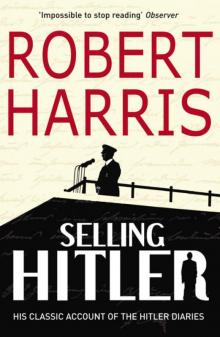 Selling Hitler
Selling Hitler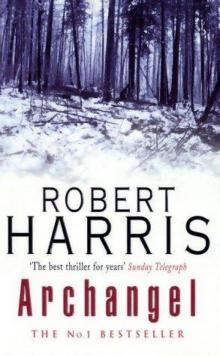 Archangel (Mass Market Paperback)
Archangel (Mass Market Paperback)